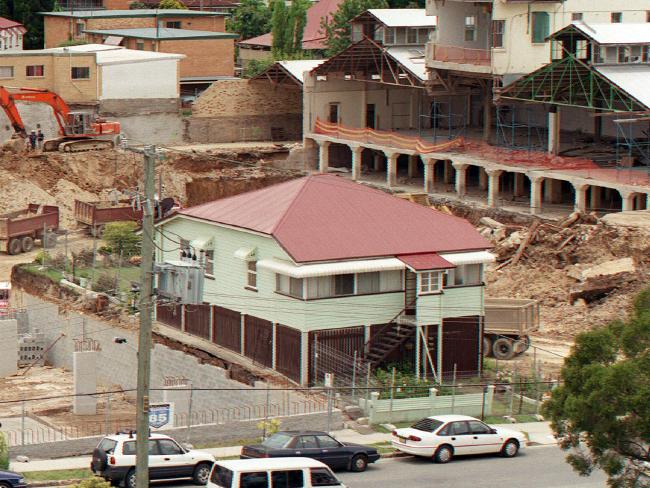THEY say a man’s home is his castle.
Tear-jerking scripts have been written about the David and Goliath struggle between the humble homeowner and big business, but the classic tale behind films like The Castle and Up really do happen.
Known as “nail houses” after a Chinese expression that translates as “stubborn nails” the term was coined by developers in China who consider holdout homeowners as nails which can neither be pounded down into the wood, or removed.
Fifteen years ago Norman and Janet Richards refused to give up their three-bedroom home when developers came knocking — even when they got out their fat cheque books.
But now after the passing of Mr Richards, and Mrs Richards’ move into a retirement home, 42 Mollison St will finally be sold to the highest bidder on November 18.
Known as “nail houses” after a Chinese expression that translates as “stubborn nails” the term was coined by developers in China who consider holdout homeowners as nails which can neither be pounded down into the wood, or removed.
Fifteen years ago Norman and Janet Richards refused to give up their three-bedroom home when developers came knocking — even when they got out their fat cheque books.
But now after the passing of Mr Richards, and Mrs Richards’ move into a retirement home, 42 Mollison St will finally be sold to the highest bidder on November 18.
In 2000 the work began, but the Richards stayed put. Picture: Hanson Jamie
Australia’s own ‘Up’ house was put on the market last month and has since attracted a lot of attention according to selling agent Chris Kazonis of Drakos Real Estate.
“The interest has been interesting,” he told news.com.au, adding that everyone from homeowners to developers and restaurateurs have been calling.
“But people are pretty coy about just how much they’ll be willing to pay for it,” he said.
Mr Kazonis said there is nothing else quiet like it in the neighbourhood so it is difficult to price.
“We just don’t have any direct comprables,” he said.
According to RP Data Core Logic figures, the median sale price for a house in South Brisbane is $1 million.
The humble home is sandwiched between a shopping complex, which houses a Coles supermarket and 25 speciality shops on one side, unit blocks on the other and parking underground.
St Leonards, Sydney
“The interest has been interesting,” he told news.com.au, adding that everyone from homeowners to developers and restaurateurs have been calling.
“But people are pretty coy about just how much they’ll be willing to pay for it,” he said.
Mr Kazonis said there is nothing else quiet like it in the neighbourhood so it is difficult to price.
“We just don’t have any direct comprables,” he said.
According to RP Data Core Logic figures, the median sale price for a house in South Brisbane is $1 million.
The humble home is sandwiched between a shopping complex, which houses a Coles supermarket and 25 speciality shops on one side, unit blocks on the other and parking underground.
St Leonards, Sydney
For decades St Leonards on Sydney’s North Shore has been a pot pourri of apartment blocks and office towers, but one pint-sized property stood out from the developed crowd.
Sitting on a tiny 223sq m block, 19 Chandos St was the home of a family-run jewellery business John Clarke & Son for more than 75 years.
When the owner decided to wind up the business earlier this year, the single-storey residence was listed on the market with price expectations of about $3.5 million. It was bought by the family back in 1960 for 3000 pounds.
The unique property failed to sell under the hammer after in June, but has since been sold for an undisclosed sum.
Sitting on a tiny 223sq m block, 19 Chandos St was the home of a family-run jewellery business John Clarke & Son for more than 75 years.
When the owner decided to wind up the business earlier this year, the single-storey residence was listed on the market with price expectations of about $3.5 million. It was bought by the family back in 1960 for 3000 pounds.
The unique property failed to sell under the hammer after in June, but has since been sold for an undisclosed sum.
This Content was originally posted on: Kirsten Craze




